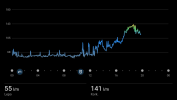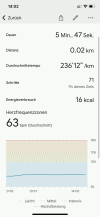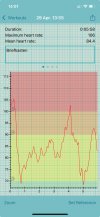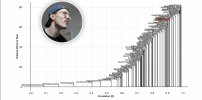Jem, I agree it's not the answer for everyone, as things other than physical activity can trigger PEM too. And I have the same problem with the Workwell 15 beats above resting heart rate. Mine also averages 70, and getting out of bed and being up for a minute or 2 takes it over 85. But I have still found it helpful, not on its own, but more as a bit of evidence to tell me that, yes, I have done too much and need to stop.
I can walk about in my house (no stairs) and cobble meals together for me and my daughter, usually mostly ready meals. It's tempting when I've been upright for, say 3 minutes, to do just one more thing, but I can feel OI kicking in and know I need to lie down. Looking at my fitbit at that stage and confirming that my HR has gone over 100 confirms it. It has made me better at taking notice of my symptoms and stopping sooner.
It also tells me when I've been doing too much angry letter writing, as that can send my heart rate up too.
I can walk about in my house (no stairs) and cobble meals together for me and my daughter, usually mostly ready meals. It's tempting when I've been upright for, say 3 minutes, to do just one more thing, but I can feel OI kicking in and know I need to lie down. Looking at my fitbit at that stage and confirming that my HR has gone over 100 confirms it. It has made me better at taking notice of my symptoms and stopping sooner.
It also tells me when I've been doing too much angry letter writing, as that can send my heart rate up too.
Last edited:




